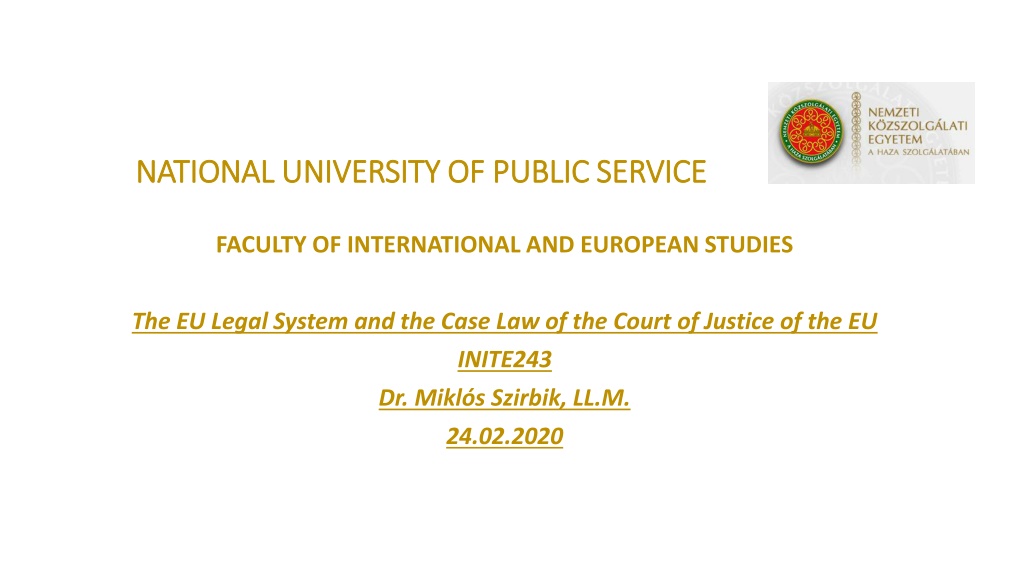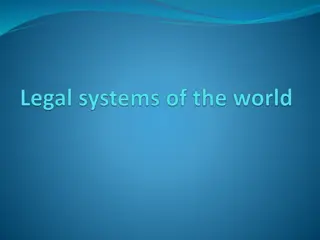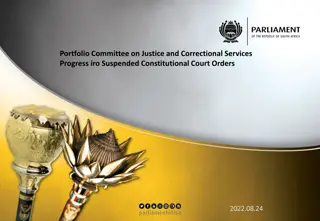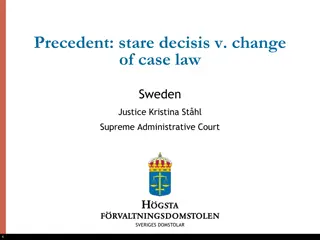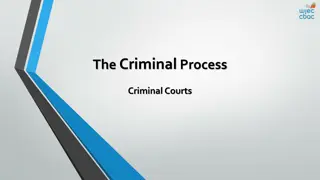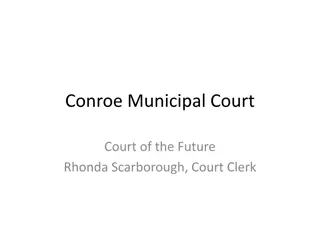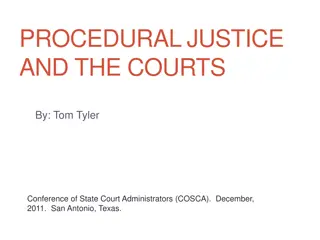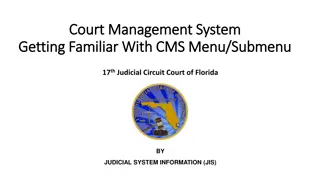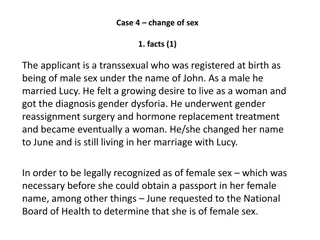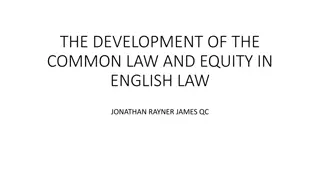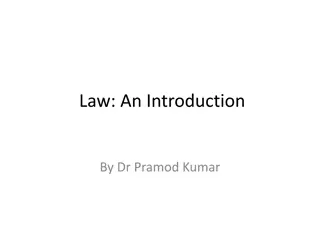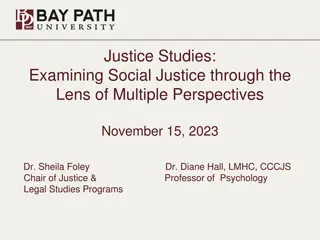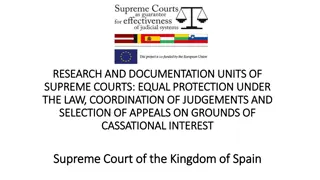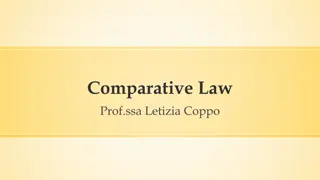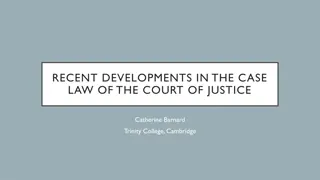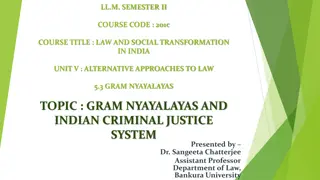Introduction to EU Legal System and Court of Justice Case Law
The European Union has a unique legal system with primary and secondary laws, general principles, case law from the Court of Justice, and international law sources. The Court of Justice ensures the supremacy of EU law over national laws through principles like precedence. Dr. Miklás Szirbik provides an insightful overview of the EU legal system and its significance in upholding the rule of law in the EU.
Download Presentation

Please find below an Image/Link to download the presentation.
The content on the website is provided AS IS for your information and personal use only. It may not be sold, licensed, or shared on other websites without obtaining consent from the author. Download presentation by click this link. If you encounter any issues during the download, it is possible that the publisher has removed the file from their server.
E N D
Presentation Transcript
NATIONAL NATIONAL UNIVERSITY UNIVERSITY OF OF PUBLIC PUBLIC SERVICE SERVICE FACULTY OF INTERNATIONAL AND EUROPEAN STUDIES The EU Legal System and the Case Law of the Court of Justice of the EU INITE243 Dr. Mikl s Szirbik, LL.M. 24.02.2020
Mikls Szirbik, Mikl s Szirbik, The EU Legal System and the Case Law The EU Legal System and the Case Law of the Court of Justice of the EU of the Court of Justice of the EU AGENDA 1. Introduction into legal systems of the EU 2. The EU Parliament 3. Rulings of the EU Court of Justice related to the EP
Mikls Szirbik, Mikl s Szirbik, The EU Legal System and the Case Law The EU Legal System and the Case Law of the Court of Justice of the EU of the Court of Justice of the EU Introduction into legal systems of the EU The EU has a legal system and law of its own (sui generis) - the main rules and principles are laid down in the founding Treaties. The EU can adopt legal and legislative acts, which the Member States have to respect and to apply. Compared to that, other organizations have much less law setting capacities: Articles 10 and 14 of the UN Charter refer to General Assembly resolutions as "recommendations however, they have impact on interpretation of legaly binding sources of IPL
Mikls Szirbik, Mikl s Szirbik, The EU Legal System The EU Legal System and the Case Law of the Court of Justice of the EU and the Case Law of the Court of Justice of the EU 1. Sources of EU law The two main sources of EU law are: primary law and secondary law. Primary law is constituted by treaties laying down the legal framework of the European Union. Secondary law is composed of legal instruments based on these treaties, such as regulations, directives, decisions and agreements. In addition, there are general principles of EU law, the case law developed by the European Court of Justice and international law.
Mikls Szirbik, Mikl s Szirbik, The EU Legal System The EU Legal System and the Case Law of the Court of Justice of the EU and the Case Law of the Court of Justice of the EU 1. Sources of EU law General principles of EU law (example): Court of Justice, Case 6/64, 15. July 1964, Costa v E.N.E.L.: According to the precedence principle, European law is superior to the national laws of Member States. The precedence principle applies to all European acts with a binding force. Therefore, Member States may not apply a national rule which contradicts to European law. The precedence principle guarantees the superiority of European law over national laws. It is a fundamental principle of European law. As with the direct effect principle, it is not inscribed in the Treaties, but has been enshrined by the Court of Justice of the European Union (CJEU). Further information: https://eur-lex.europa.eu/legal-content/EN/TXT/?uri=LEGISSUM%3Al14548
Mikls Szirbik, Mikl s Szirbik, The EU Legal System The EU Legal System and the Case Law and the Case Law of the Court of Justice of the EU of the Court of Justice of the EU TFEU CHAPTER 2 LEGAL ACTS OF THE UNION, ADOPTION PROCEDURES AND OTHER PROVISIONS SECTION 1 THE LEGAL ACTS OF THE UNION Article 288
Mikls Szirbik, Mikl s Szirbik, The EU Legal System The EU Legal System and the Case Law and the Case Law of the Court of Justice of the EU of the Court of Justice of the EU Which acts in your national law remindyou on the following ones? Art. 288 TFEU To exercise the Union's competences, the institutions shall adopt regulations, directives, decisions, recommendations and opinions. A regulation shall have general application. It shall be binding in its entirety and directly applicable in all Member States. A directive shall be binding, as to the result to be achieved, upon each Member State to which it is addressed, but shall leave to the national authorities the choice of form and methods. A decision shall be binding in its entirety. A decision which specifies those to whom it is addressed shall be binding only on them. Recommendations andopinions shall have no binding force.
Mikls Szirbik, Mikl s Szirbik, The EU Legal System The EU Legal System and the Case Law and the Case Law of the Court of Justice of the EU of the Court of Justice of the EU Examples: Regulations - Regulation (EU) 2016/679 of the European Parliament and of the Council of 27 April 2016 on the protection of natural persons with regard to the processing of personal data and on the free movement of such data, and repealing Directive 95/46/EC (General Data Protection Regulation) (Text with EEA relevance) https://eur-lex.europa.eu/legal-content/EN/TXT/?uri=celex%3A32016R0679
Mikls Szirbik, Mikl s Szirbik, The EU Legal System The EU Legal System and the Case Law and the Case Law of the Court of Justice of the EU of the Court of Justice of the EU Examples: Directives - Directive 2014/24/EU of the European Parliament and of the Council of 26 February 2014 on public procurement and repealing Directive 2004/18/EC Text with EEA relevance https://eur-lex.europa.eu/legal-content/EN/TXT/?uri=celex%3A32014L0024
Mikls Szirbik, Mikl s Szirbik, The EU Legal System The EU Legal System and the Case Law and the Case Law of the Court of Justice of the EU of the Court of Justice of the EU Examples: Decisions (1) Greece Aluminum Case, (2) Poland- Aid scheme for compensation of damage caused by the floods in Poland http://ec.europa.eu/competition/state_aid/cases/234935/234935_1079057_10_1.p df http://ec.europa.eu/competition/state_aid/cases/237314/237314_1142520_25_2.p df
Mikls Szirbik, Mikl s Szirbik, The EU Legal System The EU Legal System and the Case Law and the Case Law of the Court of Justice of the EU of the Court of Justice of the EU The Procedure of law setting in the EU Article 289 TFEU 1. The ordinary legislative procedure shall consist in the joint adoption by the European Parliament and the Council of a regulation, directive or decision on a proposal from the Commission. This procedure is defined in Article 294. 2. In the specific cases provided for by the Treaties, the adoption of a regulation, directive or decision by the European Parliament with the participation of the Council, or by the latter with the participation of the European Parliament, shall constitute a special legislative procedure. 3. Legal acts adopted by legislative procedure shall constitute legislative acts. 4. In the specific cases provided for by the Treaties, legislative acts may be adopted on the initiative of a group of Member States or of the European Parliament, on a recommendation from the European Central Bank or at the request of the Court of Justice or the European Investment Bank.
Mikls Szirbik, Mikl s Szirbik, The EU Legal System The EU Legal System and the Case Law and the Case Law of the Court of Justice of the EU of the Court of Justice of the EU The Competences of the EU and the MS CATEGORIES AND AREAS OF UNIONCOMPETENCE Article 2 TFEU 1. When the Treaties confer on the Union exclusive competence in a specific area, only the Union may legislate and adopt legally binding acts, the Member Statesbeing able to do so themselves only if so empoweredby the Union or for the implementationof Union acts. 2. When the Treaties confer on the Union a competence shared with the Member States in a specific area, the Union and the Member States may legislate and adopt legally binding acts in that area. The Member States shall exercise their competence to the extent that the Union has not exercised its competence. The Member Statesshall again exercise their competence to the extent that the Unionhas decided to cease exercising its competence. 3. The Member States shall coordinate their economic and employment policies within arrangements as determined by this Treaty, which the Union shall have competenceto provide. 4. The Union shall have competence, in accordance with the provisions of the Treaty on European Union, to define and implement a common foreign and security policy,including the progressive framing of a commondefence policy. 5. In certain areas and under the conditions laid down in the Treaties, the Union shall have competence to carry out actions to support, coordinate or supplementthe actionsof the Member States,withoutthereby superseding their competencein these areas. Legally binding acts of the Union adopted on the basis of the provisions of the Treaties relating to these areas shall not entail harmonisation of Member States'laws or regulations. 6. The scopeof and arrangementsfor exercisingthe Union'scompetencesshall be determinedby the provisionsof the Treaties relating to each area.
Mikls Szirbik, Mikl s Szirbik, The EU Legal System The EU Legal System and the Case Law and the Case Law of the Court of Justice of the EU of the Court of Justice of the EU The Competences of the EU and the MS Article 3 TFEU 1. The Union shall have exclusive competence in the following areas: (a) customs union; (b) the establishing of the competition rules necessary for the functioning of the internal market; (c) monetary policy for the Member States whose currency is the euro; (d) the conservation of marine biological resources under the common fisheries policy; (e) common commercial policy. 2. The Union shall also have exclusive competence for the conclusion of an international agreement when its conclusion is provided for in a legislative act of the Union or is necessary to enable the Union to exercise its internal competence, or in so far as its conclusion may affect common rules or alter their scope.
Mikls Szirbik, Mikl s Szirbik, The EU Legal System The EU Legal System and the Case Law and the Case Law of the Court of Justice of the EU of the Court of Justice of the EU Article 4 TFEU 1. The Union shall share competence with the Member Stateswhere the Treatiesconfer on it a competencewhich does not relate to the areas referred to in Articles 3 and 6. 2. Shared competencebetween the Union and the Member Statesapplies in the followingprincipal areas: (a) internal market; (b) socialpolicy, for the aspectsdefined in this Treaty; (c) economic,socialand territorialcohesion; (d) agriculture and fisheries, excluding the conservationof marine biologicalresources; (e) environment; (f) consumerprotection; (g) transport; (h) trans-Europeannetworks; (i) energy; (j) area of freedom, security and justice; (k) commonsafety concernsin public health matters,for the aspectsdefined in this Treaty. 3. In the areas of research, technological development and space, the Union shall have competence to carry out activities, in particular to define and implement programmes; however, the exercise of that competence shall not result in Member Statesbeing prevented from exercising theirs. 4. In the areas of development cooperation and humanitarian aid, the Union shall have competence to carry out activities and conduct a common policy; however, the exercise of that competenceshall not result in MemberStatesbeing prevented from exercisingtheirs.
Mikls Mikl sSzirbik, Szirbik, Public PublicLaw Law of of the theEuropean European Union Union The European Parliament
Mikls Szirbik, Mikl s Szirbik, The EU Legal System The EU Legal System and the Case Law and the Case Law of the Court of Justice of the EU of the Court of Justice of the EU History of EP 1952-1957: Consultative Assembly Its members were elected by the national parliaments of the MS. As indicated in the name, it had to be heard by the Council while lawsetting but it did not create the itself the European legal sources. In 1979 shortly after the 1957 Treaties the EP was elected directly for the first time and it broadened its importance continuously. Today it is a co-legislative organ.
Mikls Szirbik, Mikl s Szirbik, The EU Legal System and the Case Law The EU Legal System and the Case Law of the Court of Justice of the EU of the Court of Justice of the EU EPP since July 2019: David-Maria Sassoli
Mikls Szirbik, Mikl s Szirbik, Mikl s Mikl s Szirbik Szirbik, Legal System of the EU , Legal System of the EU Legislation in the EU RELEVANCE of EU law-setting The largest Economy in the world, close to 500 Mio citizens: During the 7th legislature (2009-2014) the Commission presented 584 proposals falling under the co- decision/legislative ordinary procedure, up from 508 during the 6th legislature (2004-2009) and 432 during the 5th legislature (1999-2004). During the 7th legislature, proposals for the co-decision/ordinary legislative procedure amounted to 89% of all 658 legislative proposals from the Commission, compared to 49% during the 6th legislation (out of 1041 proposals), 42% during the 5th legislation (out of 1028 proposals) and 21% during the 4th legislation (1994-1999).
Mikls Szirbik, Mikl s Szirbik, Mikl s Mikl s Szirbik Szirbik, Legal System of the EU , Legal System of the EU Legislation in the EU Forms of EU law-setting In the adoption of legislative acts, a distinction is made between the ordinary legislative procedure (codecision), which puts Parliament on an equal footing with the Council, and the special legislative procedures, which apply only in specific cases where Parliament has only a consultative role. On certain questions (e.g. taxation) the European Parliament gives only an advisory opinion (the consultation procedure ). In some cases the Treaty provides that consultation is obligatory, being required by the legal base, and the proposal cannot acquire the force of law unless Parliament has delivered an opinion. In this case the Council is not empowered to take a decision alone.
Mikls Szirbik, Mikl s Szirbik, Mikl s Mikl s Szirbik Szirbik, Legal System of the EU , Legal System of the EU Legislation in the EU Consultation The European Parliament may approve or reject a legislative proposal, or propose amendments to it. The Council is not legally obliged to take account of Parliament s opinion but in line with the case-law of the Court of Justice, it must not take a decision without having received it. In the beginning, the 1957 Treaty of Rome gave Parliament an advisory role in the legislative process; the Commission proposed and the Council adopted legislation. The Single European Act (1986) and the Maastricht, Amsterdam, Nice and Lisbon Treaties successively extended Parliament s prerogatives. It can now co-legislate on equal footing with the Council in a vast majority of areas (see Ordinary legislative procedure) and consultation became a special legislative procedure (or even a non-legislative procedure) used in a limited number of cases. This procedure is now applicable in a limited number of legislative areas, such as internal market exemptions and competition law. Parliament s consultation is also required, as a non-legislative procedure, where international agreements are being adopted under the Common Foreign and Security Policy (CFSP).
Mikls Szirbik, Mikl s Szirbik, Mikl s Mikl s Szirbik Szirbik, Legal System of the EU , Legal System of the EU Legislation in the EU Ordinary legislative procedure Art. 294 TFEU 1. Where reference is made in the Treaties to the ordinary legislative procedure for the adoption of an act, the following procedure shall apply. 2. The Commission shall submit a proposal to the European Parliament and the Council. Question: what does the term act cover in Art. 294 paragraph 1? Support your answer with a relevant Article of the TFEU discussed in earlier classes!
Mikls Szirbik, Mikl s Szirbik, Mikl s Mikl s Szirbik Szirbik, Legal System of the EU , Legal System of the EU Legislation in the EU Ordinary legislative procedure Art. 294 TFEU First reading according to paragraphs 3-6 of Art. 294 TFEU 3. The European Parliament shall adopt its position at first reading and communicate it to the Council. 4. If the Council approves the European Parliament's position, the act concerned shall be adopted in the wording which corresponds to the position of the European Parliament. 5. If the Council does not approve the European Parliament's position, it shall adopt its position at first reading and communicate it to the European Parliament. 6. The Council shall inform the European Parliament fully of the reasons which led it to adopt its position at first reading. The Commission shall inform the European Parliament fully of its position.
Mikls Szirbik, Mikl s Szirbik, Mikl s Mikl s Szirbik Szirbik, Legal System of the EU , Legal System of the EU Legislation in the EU Ordinary legislative procedure Art. 294 TFEU Second reading according to paragraphs 7-9 of Art. 294 TFEU 7. If, within three months of such communication, the European Parliament: (a) approves the Council's position at first reading or has not taken a decision, the act concerned shall be deemed to have been adopted in the wording which corresponds to the position of the Council; (b) rejects, by a majority of its component members, the Council's position at first reading, the proposed act shall be deemed not to have been adopted; (c) proposes, by a majority of its component members, amendments to the Council's position at first reading, the text thus amended shall be forwarded to the Council and to the Commission, which shall deliver an opinion on those amendments. 8. If, within three months of receiving the European Parliament's amendments, the Council, acting by a qualified majority: (a) approves all those amendments, the act in question shall be deemed to have been adopted; (b) does not approve all the amendments, the President of the Council, in agreement with the President of the European Parliament, shall within six weeks convene a meeting of the Conciliation Committee. 9. The Council shall act unanimously on the amendments on which the Commission has delivered a negative opinion.
Mikls Szirbik, Mikl s Szirbik, Mikl s Mikl s Szirbik Szirbik, Legal System of the EU , Legal System of the EU Legislation in the EU Ordinary legislative procedure Art. 294 TFEU Conciliation according to paragraphs 10-12 of Art. 294 TFEU 10. The Conciliation Committee, which shall be composed of the members of the Council or their representatives and an equal number of members representing the European Parliament, shall have the task of reaching agreement on a joint text, by a qualified majority of the members of the Council or their representatives and by a majority of the members representing the European Parliament within six weeks of its being convened, on the basis of the positions of the European Parliament and the Council at second reading. 11. The Commission shall take part in the Conciliation Committee's proceedings and shall take all necessary initiatives with a view to reconciling the positions of the European Parliament and the Council. 12. If, within six weeks of its being convened, the Conciliation Committee does not approve the joint text, the proposed act shall be deemed not to have been adopted.
Mikls Szirbik, Mikl s Szirbik, Mikl s Mikl s Szirbik Szirbik, Legal System of the EU , Legal System of the EU Legislation in the EU Ordinary legislative procedure Art. 294 TFEU Third reading according to paragraphs 13-15 of Art. 294 TFEU 13. If, within that period, the Conciliation Committee approves a joint text, the European Parliament, acting by a majority of the votes cast, and the Council, acting by a qualified majority, shall each have a period of six weeks from that approval in which to adopt the act in question in accordance with the joint text. If they fail to do so, the proposed act shall be deemed not to have been adopted. 14. The periods of three months and six weeks referred to in this Article shall be extended by a maximum of one month and two weeks respectively at the initiative of the European Parliament or the Council. Special provisions 15. Where, in the cases provided for in the Treaties, a legislative act is submitted to the ordinary legislative procedure on the initiative of a group of Member States, on a recommendation by the European Central Bank, or at the request of the Court of Justice, paragraph 2, the second sentence of paragraph 6, and paragraph 9 shall not apply. In such cases, the European Parliament and the Council shall communicate the proposed act to the Commission with their positions at first and second readings. The European Parliament or the Council may request the opinion of the Commission throughout the procedure, which the Commission may also deliver on its own initiative. It may also, if it deems it necessary, take part in the Conciliation Committee in accordance with paragraph 11.
Mikls Szirbik, Mikl s Szirbik, Mikl s Mikl s Szirbik Szirbik, Legal System of the EU , Legal System of the EU Legislation in the EU Other legislative procedures Opinion under Article 140 Treaty on the Functioning of the European Union (monetary union) The Commission and the European Central Bank draw up reports for the Council on the progress in fulfilling their obligations as regards economic and monetary union of Member States with a derogation.After Parliament has delivered its opinion, the Council on the Commission s proposal, decides which Member States with a derogation fulfil the conditions for adoption of the single currency on the basis of the criteria laid down in Article 140(1) TFEU and ends these Member States derogations. In this procedure, Parliament votes for the amendments en bloc and cannot table amendments.
Mikls Szirbik, Mikl s Szirbik, Mikl s Mikl s Szirbik Szirbik, Legal System of the EU , Legal System of the EU Legislation in the EU Summary material of EP related to legislation with additional information: https://www.europarl.europa.eu/about-parliament/hu/powers-and-procedures/legislative-powers
Mikls Szirbik, Mikl s Szirbik, The EU Legal System and the Case Law The EU Legal System and the Case Law of the Court of Justice of the EU of the Court of Justice of the EU European Court of Justice decides in favor of European Parliament in Case C-124/13 https://eur-lex.europa.eu/legal- content/EN/TXT/?uri=uriserv:OJ.C_.2013.156.01.0021.01.ENG http://ebcd.org/european-court-of-justice-decides-in-favor-of- european-parliament-in-cod-case/
Mikls Szirbik, Mikl s Szirbik, The EU Legal System and the Case Law The EU Legal System and the Case Law of the Court of Justice of the EU of the Court of Justice of the EU European Court of Justice decides in favor of European Parliament in - Case C-73/17 (France v. EP)
Thank you for your attention! Thank you for your attention!
